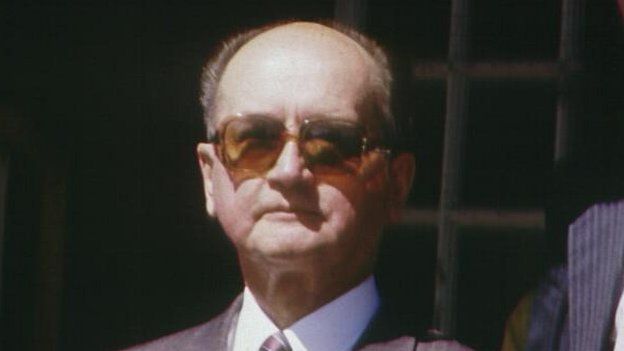Obituary: Wojciech Jaruzelski
- Published

He described himself as a Polish patriot doing his best for the country
By the time Wojciech Jaruzelski came to power in Poland the first cracks were appearing in the edifice of Communism across Eastern Europe.
For 10 years he resisted demands for reform until economic pressures finally saw the demise of Poland's last Communist leader.
Wojciech Jaruzelski was born on 6 Jul 1923 and raised on the family estate in Wysokie.
The signing of the German-Soviet non-aggression pact in 1939 persuaded Jaruzelski and his family to flee to Lithuania, before they were deported to South Western Siberia where his father died in a labour camp.
The BBC's Caroline Hawley takes a look back at General Wojciech Jaruzelski's life
He too became a forced labourer in the Karaganda coal mines in Kazakhstan suffering permanent damage to his back and eyes as a result.
When Germany invaded the Soviet Union in 1941, the Russians began forming Polish army units and the young Jaruzelski became one of the first to join.
High flyer
He fought in the Battle of Berlin in May 1945 which saw the final collapse of Nazi Germany and ended the war as a lieutenant.
As an officer in the Polish People's Army he took part in the suppression of the Polish wartime resistance movement which was opposing Poland's pro-Soviet government.
One of the last old style communist leaders meets another, Fidel Castro
After graduating from the Polish Higher Infantry School and general staff academy, Jaruzelski rose quickly through the ranks.
His career progression accelerated after the departure in 1956 of the Soviet Field Marshal, Konstantin Rokossovsky, who had been installed by Stalin as Poland's Commander in Chief and Minister of Defence.
Jaruzelski became the chief "political officer" of the Polish armed forces in 1960, chief of staff in 1964, and defence minister in 1968 shortly before the Soviet invasion of Czechoslovakia in which Polish troops took part.
He was also moving up the ranks of the communist party becoming a candidate member of the Politburo in December 1970 and a full member the following year.
Martial Law
In 1971 Polish militia opened fire on striking shipyard workers in the Baltic ports and more than 40 people died.
Jarulzelski was later accused of ordering the action, something he later strenuously denied claiming the orders came direct from the Prime Minister.
In February 1981 he was appointed Prime Minister of Poland and, 10 months later, First Secretary of the Communist Party.
Martial law in Poland 1981
He found himself being squeezed between the growing popularity of the pro-democracy Solidarity movement within Poland and pressure from the Soviet Union which had massed 20 tank divisions on the border.
In December 1981 he declared martial law and thousands of Solidarity members were arrested including the movements charismatic leader Lech Walesa.
Jaruzelski justified his action as a means of preventing a Soviet invasion although the Russian leader Boris Yeltsin later released files which indicated that the Soviets had no such plans.
Martial law was lifted in 1983 although Solidarity remained a banned organisation.
It was economic pressure which forced change on the Jaruzelski government coupled with the influence of reform in the former USSR under Mikhail Gorbachev.
On trial
There was growing unrest in the country and a series of strikes forced Jaruzelski to begin negotiations with Solidarity in 1989.
After two months of talks Jaruzelski was forced to concede a radical change in the structure of the administration in Poland.
Solidarity triumphed in the resulting elections, despite the Communist party being guaranteed 65% of the seats in the new lower chamber.
Jaruzelski, whose name was the only one the communists allowed on the ballot for President, won by just one vote.
The rise of Solidarity spelt the end for Communist rule in Poland
His offer of a coalition with Solidarity was turned down and, in December 1990, he stood down as Poland's leader to be replaced by Lech Walesa.
Jaruzelski went on trial in 2001 for his alleged part in the 1971 shipyard massacres but legal wrangling and his declining health saw no hope of an end to the hearings.
In February 2008 Jaruzelski told a reporter that he did not expect to be alive by the time any verdict was reached.
Solidarity activists attempted to have him tried for the imposition of martial law in 1981 but the courts refused to hear the case on the basis that the post-communist Polish Parliament had exonerated him in 1996.
Opinion polls also suggested that a majority of Poles were prepared to accept Jaruzelski's explanation of martial law as the "lesser evil" intended to prevent a Soviet invasion.
Described by many Poles as a dictator, who acted according to instructions from the Kremlin, he insisted he was a Polish patriot who had always tried to do the best for his country.